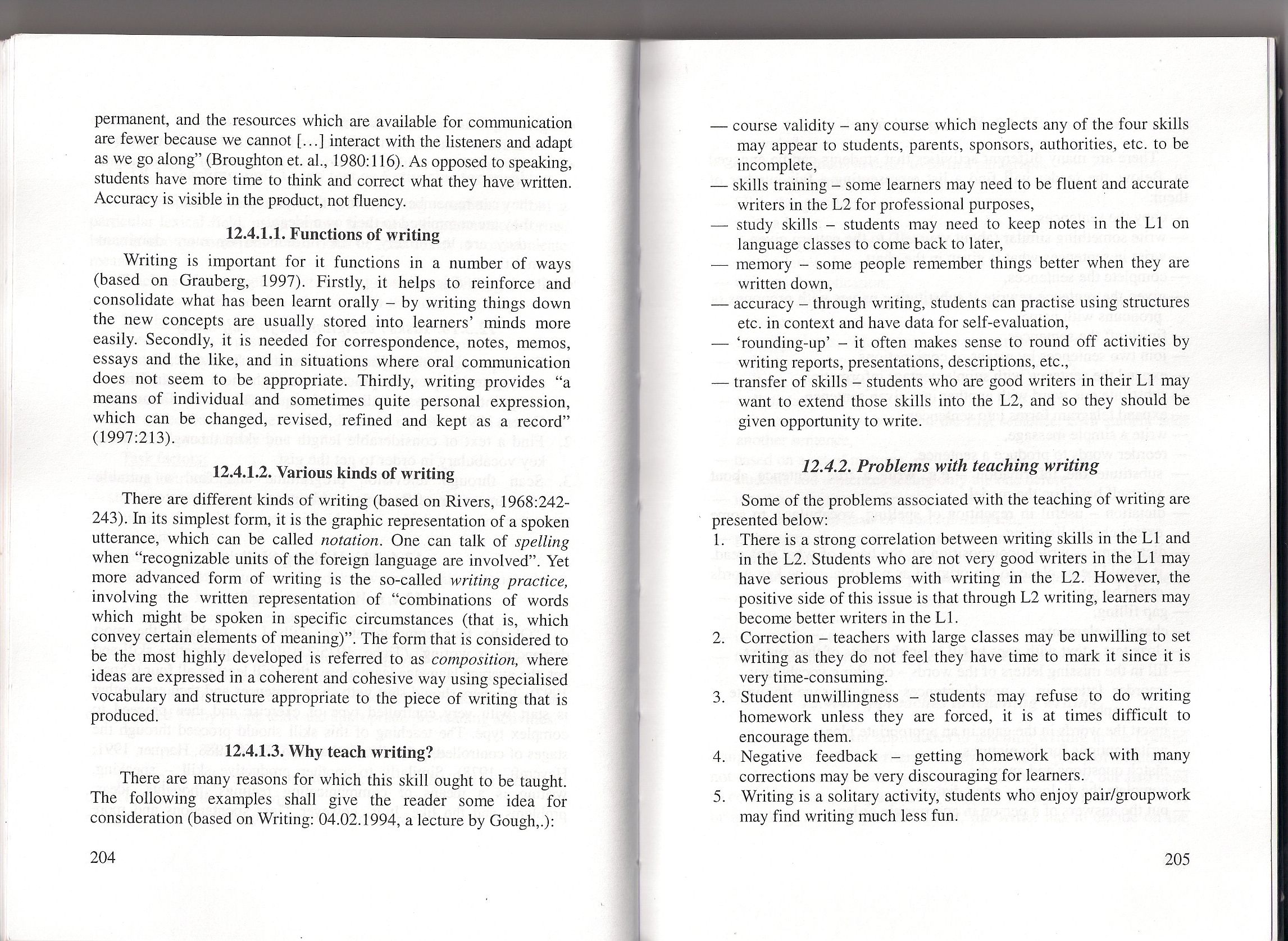64120 skanowanie0102 (2)

permanent, and the resources which are available for communication are fewer because we cannot [...] interact with the listeners and adapt as we go along” (Broughton et. al., 1980:116). As opposed to speaking, students have morę time to think and correct what they have written. Accuracy is visible in the product, not fluency.
12.4.1.1. Functions of writing
Writing is important for it functions in a number of ways (based on Grauberg, 1997). Firstly, it helps to reinforce and consolidate what has been learnt orally — by writing things down the new concepts are usually stored into learners’ minds morę easily. Secondly, it is needed for correspondence, notes, memos, essays and the like, and in situations where orał communication does not seem to be appropriate. Thirdly, writing provides “a means of individual and sometimes quite personal expression, which can be changed, revised, refined and kept as a record” (1997:213).
12.4.1.2. Yarious kinds of writing
There are different kinds of writing (based on Rivers, 1968:242-243). In its simplest form, it is the graphic representation of a spoken utterance, which can be called notation. One can talk of spelling when “recognizable units of the foreign language are involved”. Yet morę advanced form of writing is the so-called writing practice, involving the written representation of “combinations of words which might be spoken in specific circumstances (that is, which convey certain elements of meaning)”. The form that is considered to be the most highly developed is referred to as composition, where ideas are expressed in a coherent and cohesive way using specialised vocabulary and structure appropriate to the piece of writing that is produced.
12.4.1.3. Why teach writing?
There are many reasons for which this skill ought to be taught. The following examples shall give the reader some idea for consideration (based on Writing: 04.02.1994, a lecture by Gough,.):
— course validity - any course which neglects any of the four skills may appear to students, parents, sponsors, authorities, etc. to be incomplete,
w skills training - some learners may need to be fluent and accurate writers in the L2 for professional purposes, study skills- - students may need to keep notes in the LI on language classes to come back to later,
wm memory - some people remember things better when they are written down,
— accuracy - through writing, Students Can practise using structures etc. in context and have data for self-evaluation,
fi- ‘rounding-up’ - it often makes sense to round off activities by writing reports, presentations, descriptions, etc.,
— transfer of skills - students who are good writers in their LI may want to extend those skills into the L2, and so they should be given opportunity to write.
12.4.2. Problems with teaching writing
Some of the problems associated with the teaching of writing are
presented below:
1. There is a strong correlation between writing skills in the LI and in the L2. Students who are not very good writers in the LI may have serious problems with writing in the L2. However, the positive side of this issue is that through L2 writing, learners may become better writers in the LI.
2. Correction - teachers with large classes may be unwilling to set writing as they do not feel they have time to mark it sińce it is very time-consuming.
3. Student unwillingness - students may refiise to do writing homework unless they are forced, it is at times difficult to encourage them.
4. Negative feedback - getting homework back with many corrections may be very discouraging for learners.
5. Writing is a solitary activity, students who enjoy pair/groupwork may fmd writing much less fun.
205
Wyszukiwarka
Podobne podstrony:
ment systems, i.e. CAM and/or CIM, which are op-erated in the production company. After information
CHAPTER II 22 86230 oUentelf and, therefore, the lnterests which are cared for by the political ephe
mc03 Which Are the Most Stubbora Musclea? The raus- cles uf the forearm and the cali What Are the Mo
00270 d021c6388981baccfa088288e9ff089 272 Montgomery Choice of Factors and Levels As noted in Table
File0018 Messages 1 can OJJir my cotyratulatioru or sympathy. Read the notes. Which are: Li- a
V. of the 19th century romantic, — Tchai-kovsky and the like, which is under-sta
74590 jackoltrn vampire1 ©2001 by Lowe s®. Al rights reserved. Lowe s and the gabłe design are regis
screenshot 1 Remove Revions This setting removes the revisions which are older than the given days.
The difficulties, which are connected with undisturbed sampling, tend to promote direct field tests
mbs 031 MY BREATHING SYSTEM the uppc-r jaw advancc, and the brow and the upper eyelids are unnaturaU
WT VSV and the Mmsir mutant are actively being developed for clinical oncolytic applications (Diaz e
więcej podobnych podstron